ASTANA – This year, President Kassym-Jomart Tokayev’s diplomatic schedule began with the first official visit to Italy, Kazakhstan’s strategic partner and third largest trading partner. This visit should be seen through the lens of Kazakhstan’s growing cooperation with the European Union, said Yersultan Zhanseitov, a senior expert at the Astana-based Institute of World Economics and Politics.
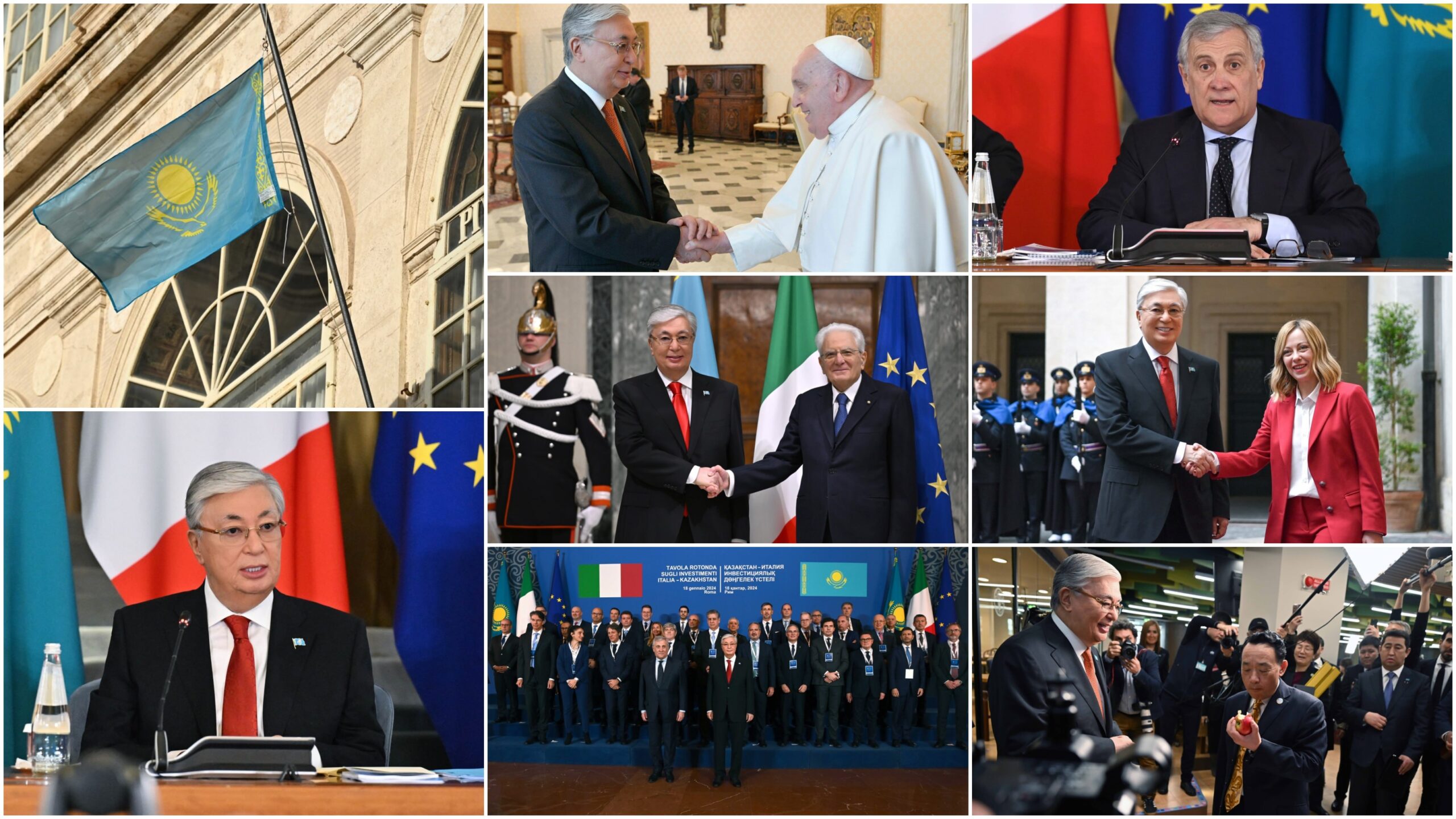
It was not only Tokayev’s first official visit in 2024 but also his first one as the President of Kazakhstan. The collage is designed by The Astana Times. Photo credit: Akorda press service
The visit signals Kazakhstan’s broader engagement with the EU, just two months after French President Emmanual Macron’s historic visit to Kazakhstan. Two months before Macron’s visit, President Tokayev himself paid an official visit to Germany, further consolidating Kazakhstan’s relations with the EU.

Yersultan Zhanseitov.
Beyond increased contacts with the EU, President Tokayev’s visit to Italy reflects Kazakhstan’s constructive, multi-vector foreign policy. The last time a Kazakh leader visited Italy was 15 years ago. Oscar Luigi Scalfaro was the only Italian president to visit Kazakhstan in May 1997.
The cooperation witnessed a milestone in 2009 after the signing of a strategic partnership agreement. In September 2023, the Italian Minister of Foreign Affairs and International Cooperation Antonio Tajani visited Kazakhstan.
“Especially in the current geopolitical situation in the world, Kazakhstan is diversifying its foreign connections, trading partners and strategic partners in general,” Zhanseitov told The Astana Times.
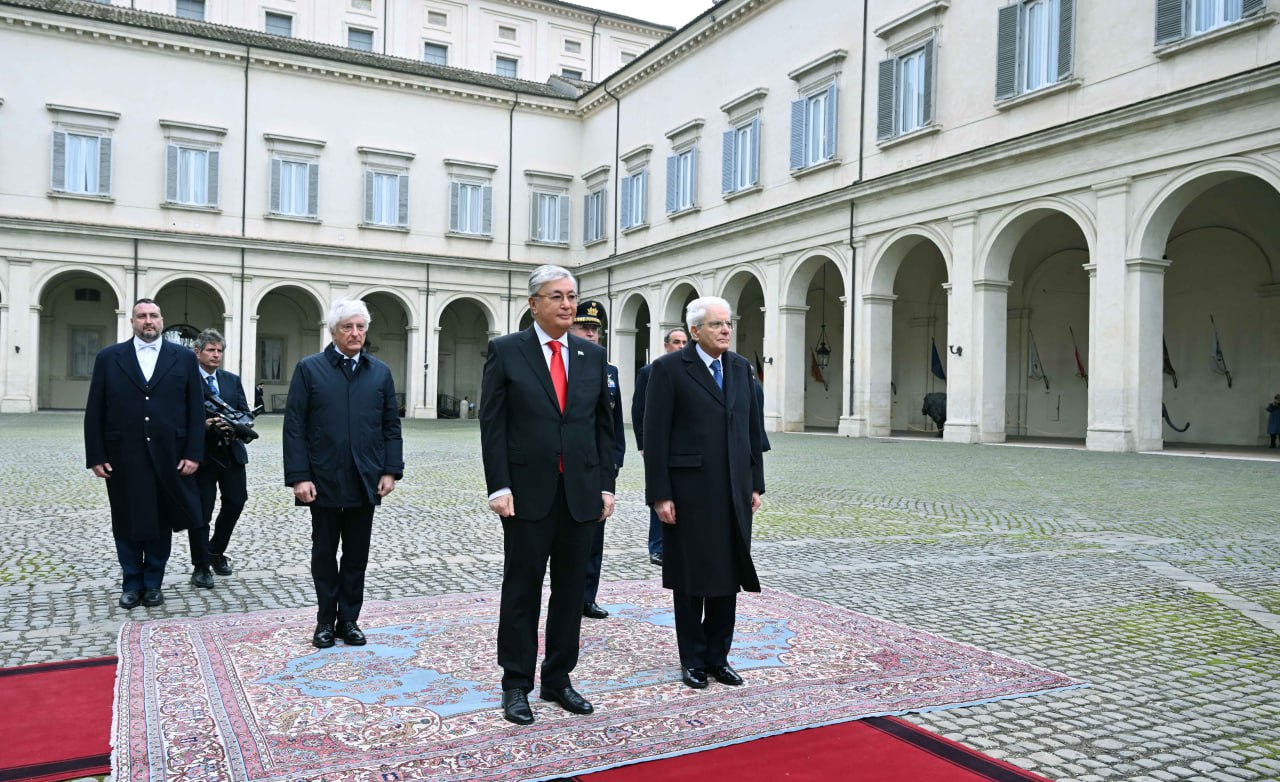
Tokayev and Mattarella before their meeting in the Quirinale Palace. Photo credit: Akorda press service
The agenda of the visit was packed. It included meetings with Italian President Sergio Mattarella and Prime Minister Georgia Meloni.
Business and economy
Data from the Ministry of National Economy show that trade turnover between Kazakhstan and Italy between January and October 2023 reached $13.1 billion, just 0.7% more than the same period in 2021.
Out of this, Kazakh exports to Italy made $12.1 billion, and crude oil accounts for 97.4%, or $11.8 billion. In more than 30 years of cooperation, the energy sector has become a pillar of bilateral cooperation between Kazakhstan and Italy.
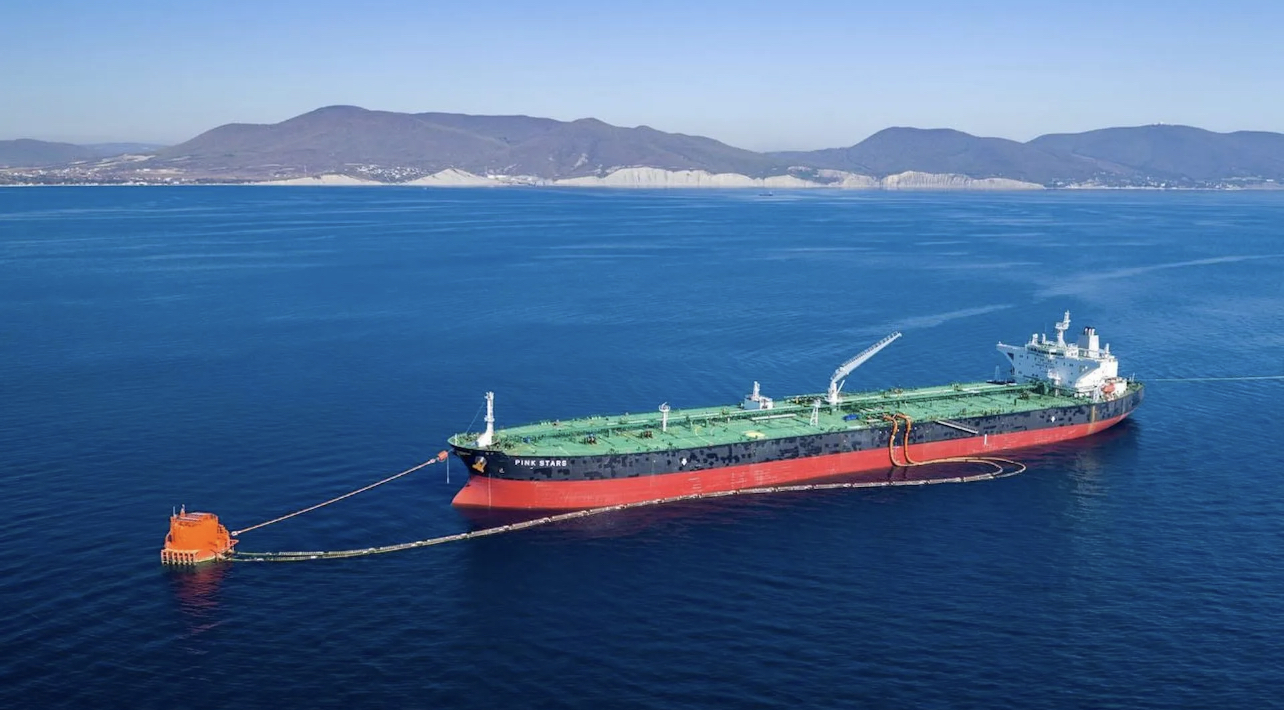
Over 70% of Kazakh oil exports go to the EU, meeting 6% of EU oil demand, according to the data from the EU Delegation in Kazakhstan. Photo credit: Caspian Pipeline Consortium
Besides oil, Kazakhstan exports wheat, ferroalloys, and unprocessed aluminum to Italy.
Imports to Kazakhstan from Italy have increased by 32.4%, reaching $1 billion. This growth stems from the increase in imports of seamless pipes, tubes, and profiles of black metals (from $15.8 million to $64 million), tractors and semi-trailers (from $1.1 million to $43 million), and equipment for soil sorting and grinding (from $7.1 million to $20.1 million), to name a few.
Kazakhstan also imports pharmaceuticals packaged for retail sale, pipeline valves, food products, vaccines, and blood serums.
“Italy is the number one exporter of oil [from Kazakhstan] within Europe, so it is pretty clear that the value of Italy in Kazakhstan’s foreign policy cannot be underestimated,” said Zhanseitov.
Signed deals
The visit was packed on the side of business and economy. A Kazakh-Italian roundtable in Rome on Jan. 18 concluded with 18 agreements worth $1.5 billion.
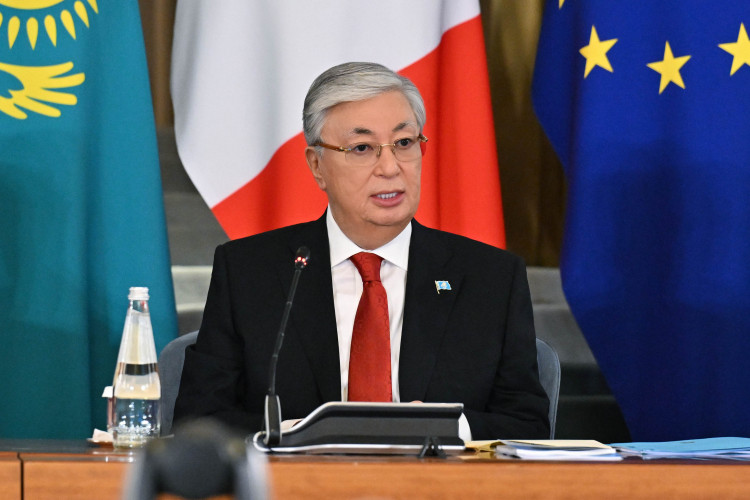
President Tokayev addressed Italian business people at the Kazakh-Italian roundtable in Rome on Jan. 19. Photo credit: Akorda.
“There are still different directions in bilateral cooperation. First, it is transport and logistics. As we know the current situation in Eastern Europe needs alternative trade and transport roads,” he said. For Kazakhstan, it is the development of the Trans-Caspian International Transport Route.
While energy has been a priority area for cooperation between Kazakhstan and Italy, Zhanseitov also sees substantial potential in diversifying energy exports and imports.
“Of course, the energy sector is the priority in our bilateral relations, but still, it can be diversified, not only by exporting oil but also by switching to uranium and rare earth metals that are essential in constructing all the facilities needed for the green energy,” said Zhanseitov.
Kazakhstan’s KazMunayGas (KMG) and Italian Eni agreed to build a hybrid power station in Zhanaozen in western Kazakhstan with a total capacity of 247 megawatts (MW).
According to the statement from KMG, the project envisions a wind power plant of 77 MW, a solar power plant of 50 MW, and a 120 MW gas power plant for supplying stable electricity to KMG’s industrial facilities in the region. A hybrid project of this type will be the first to be implemented in Kazakhstan.

Italian Eni has two Badamsha wind farms in Kazakhstan’s Aktobe region. The Badamsha 2 was inagurated in March 2022 and doubles the installed capacity of the first facility. Photo credit: eni.com
“This project is in line with the goals of diversifying the business portfolio and decarbonizing the operations of KMG and Eni, ensuring the long-term sustainable development of our operations,” said KMG CEO Magzum Mirzagaliyev. The plans are to bring the project to full design capacity by the end of 2025.
Another important document signed in the energy sector was between Kazakhstan’s Samruk Kazyna Sovereign Wealth Fund and Balestra. The document defines the terms of the implementation of a project to build a sulfuric acid plant in the Suzak district in the Turkistan Region. The capacity of the plant, which will supply sulfuric acid to the companies of the Kazatomprom national company, will be 800,000 tons per year.
Kazakhstan’s Agrofirma TNK, which produces agricultural products on 400,000 hectares of land in the Akmola Region, and Italy’s Bonifiche Ferraresi, which is engaged in the cultivation and marketing of agricultural products, agreed to exchange experience in the field of technologies, seeds, and personnel training in the initial stage of the partnership. Moving forward, the companies will work together in the development of processing, including pasta production.
Italian investments
With these projects coming into effect, more Italian investments will be injected into the Kazakh economy. Since 2005, the total volume of gross foreign direct investments from Italy to Kazakhstan has hit $7.3 billion, according to the Kazakh Ministry of National Economy.
The latest data for the first nine months of 2023 show that the gross inflow of investments reached $107.4 million, a 28.3% increase compared to the same period in 2022.
In Kazakhstan, Italian investors have been involved in projects related to energy, geological exploration and extraction of natural resources, construction, infrastructure, transportation, communications, and agriculture.
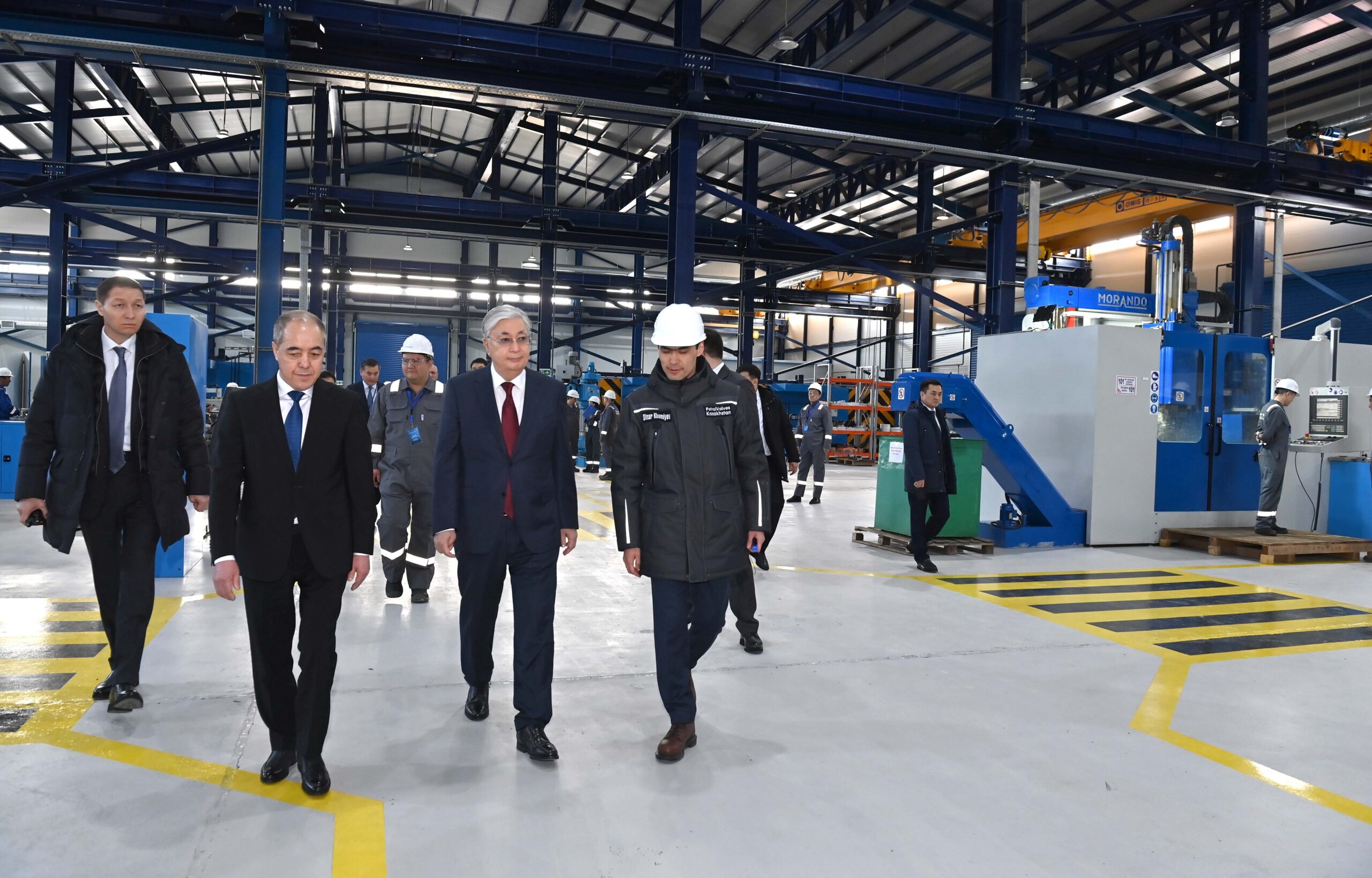
In March 2023, Tokayev visited the PetrolValves site in Aksai, which specializes in the production and repair of high-tech shut-off valves and valves used in the oil and gas industries. Photo credit: Akorda
Some notable projects include Eni’s Badamsha wind farms in the Aktobe Region and the production site of PetrolValves in Aksai in western Kazakhstan.
At the roundtable, President Tokayev invited Italian businesses to consider investing in Kazakhstan and explore such areas as service maintenance of the oil and gas industry, critical raw materials and renewable energy, transport and logistics and agroindustry.
No less significant areas
However, there are other areas where Kazakhstan and Italy can benefit from cooperation. Significant strides have been made in education and culture, notably in the creative industry.
Kazakhstan and Italy have concluded nearly 100 inter-university agreements between their universities. To foster this cooperation, during the visit, the Kazakh Ministry of Higher Education and the Ministry of University and Research of the Italian Republic signed a memorandum of understanding on cooperation in the fields of higher education, research, and innovation.
Both countries are also keen on developing creative industries, which have a multifaceted impact, encompassing economic, cultural, and social dimensions.
In 2023, the Italian Cultural Institute opened in Almaty, the first of its kind in Central Asia. This year, the plan is to open the Italian-Kazakh Cultural Center for Creative Industry.
As part of Tokayev’s visit, the Kazakh Ministry of Culture and Information and the Italian Ministry of Culture signed a memorandum of understanding on cooperation in the field of art and culture.
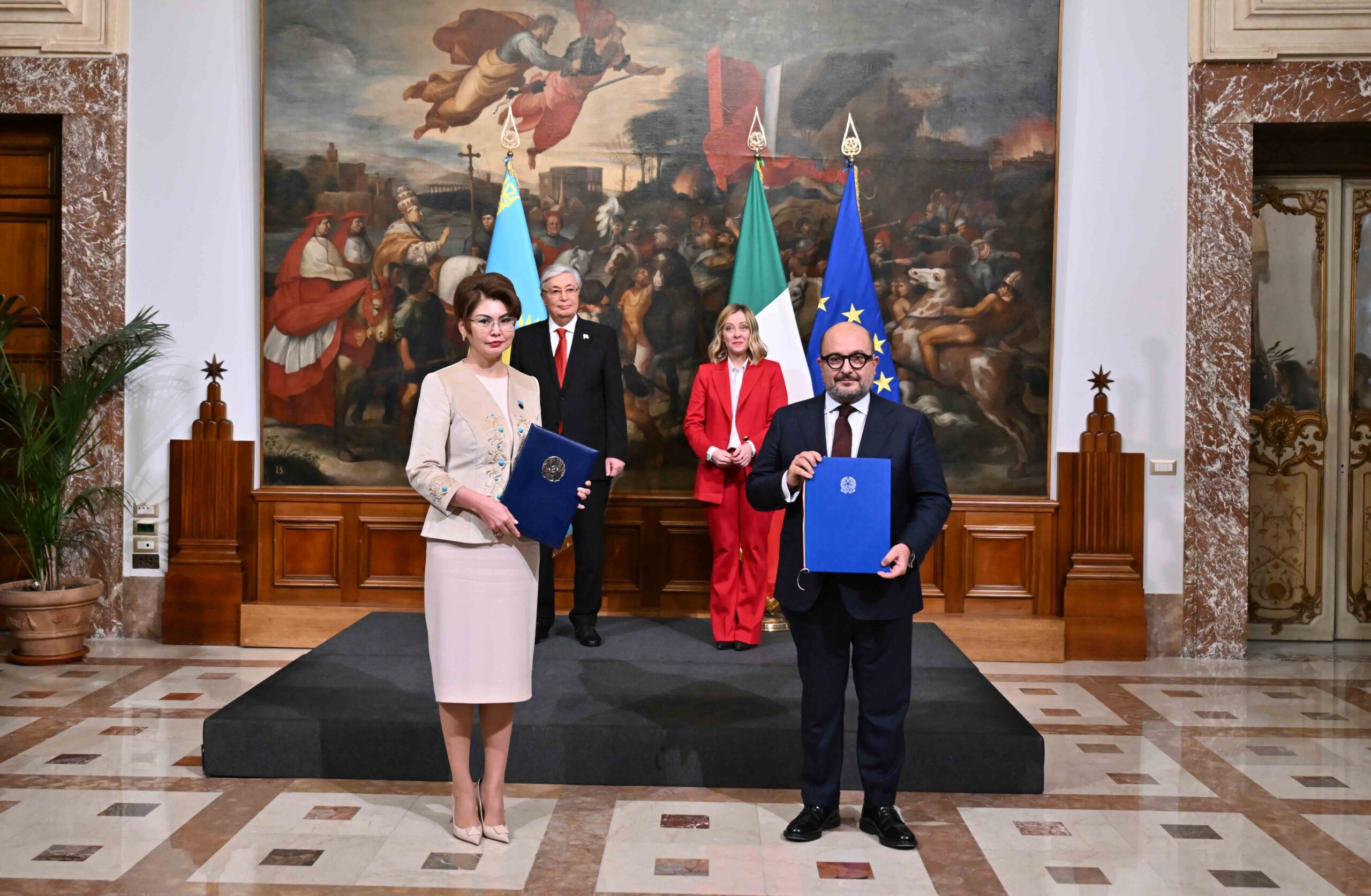
Kazakh Minister of Culture and Information Aida Balayeva signed a memorandum of understanding with Italian Minister of Culture Gennaro Sangiuliano. Photo credit: Akorda press service
According to Italian Ambassador to Kazakhstan Marco Alberti, the visit was not “merely a protocol event,” but was meant to revitalize relationships, identify areas of collaboration, and strengthen partnerships.”
“Therefore, it marks a starting point, not an endpoint. Much work lies ahead, as each commitment made during the visit must be honored,” he wrote in a social media post.
He commended a “shared ambition to grow and improve.” “There is acknowledgment that much work still needs to be done to transform the existing relations into a genuine strategic partnership,” he wrote.
During the visit, Kazakhstan and Italy agreed to open direct flights connecting Astana to Rome and Milan. This move will positively impact the countries’ effort to grow their ties, most importantly, people-to-people ties.
